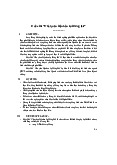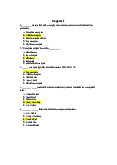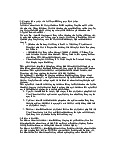



Preview text:
1.1. TRAINING POLICY
FPT has placed great emphasis on training and coaching human resources in a
methodical and long-term plan. The training system is deployed comprehensively
and extensively, from the group level to member units. And training is considered
an "impossible task" for most employees.
At FPT, 100% of new employees participate in an orientation training course
called "72 hours of experience". With this course, new members have the
opportunity to work together to understand the history, people, cultural values, and
spirit of FPT. FPT's MiniMBA course is a 35% streamlining of the Swiss-standard
MBA program along with FPT's practical development experience. FPT's senior
leaders, such as the Chairman of the Board of Directors, vice presidents, members
of the Board of Directors, etc., are all in charge of preparing curriculum and
directly teaching. Through the training course, employees can initially get
acquainted with the work and understand more about the core values of the corporation.
In addition, FPT also regularly organizes training classes to update employees
on new technology trends. FPT designs corporate training programs tailored to
organizational needs to help businesses keep up with changes, unlock new
potential, and improve employee skills and training. And training and fostering
professional skills for employees is a priority. Annually, employees are trained to
improve professional knowledge and skills to meet work needs.
FPT always focuses on training the next generation of staff. Prioritize resources
to train core staff to become the next management and leadership force, serving the
company's long-term development needs. 1.2. TRAINING PROCESS
The training process at FPT involves several steps to ensure the development and growth of its employees.
Needs Assessment: FPT conducts a thorough analysis of the knowledge, skills,
and abilities required for each job position. This helps identify the training needs of employees at different levels.
Training Plan: Based on the needs assessment, FPT creates a comprehensive
training plan that includes specific programs and activities to address the identified
gaps. The plan may involve both internal and external training resources.
Training Delivery: FPT provides training through various methods, including
classroom sessions, online courses, workshops, and seminars. These programs are
designed to provide employees with job-specific skills as well as personal and
professional development opportunities.
On-the-Job Training: FPT emphasizes practical, hands-on training to enhance
the application of knowledge in real-world situations. Employees are encouraged
to take on challenging assignments and work closely with experienced mentors.
Continuous Learning: FPT promotes a culture of continuous learning where
employees are encouraged to acquire new skills and update their knowledge
regularly. This includes participating in webinars, attending industry conferences, and pursuing certifications.
Evaluation and Feedback: FPT conducts regular evaluations to assess the
effectiveness of training programs and gather feedback from employees. This helps
in identifying areas for improvement and making necessary adjustments to the training process.
Career Development: FPT offers opportunities for career advancement and
growth based on the individual's performance and potential. Employees are
provided with mentorship programs, succession planning, and special development initiatives.
Overall, FPT's training process is designed to support employee development,
enhance job performance, and align with the company's objectives and values. By
investing in continuous learning and skill development, FPT ensures the
competitiveness of its workforce in the ever-evolving IT industry. 1.3. TRAINING METHODS
FPT Company, one of the leading IT service providers in Vietnam, focuses on
continuous learning and development to enhance the skills and knowledge of its
employees. Here are some of the training methods used by FPT Company:
Classroom Training: FPT Company conducts traditional classroom-style training
sessions where employees attend scheduled training programs facilitated by subject
matter experts. This method allows for direct interaction and discussion among participants.
Online Training: FPT Company offers online training programs that employees
can access anytime and anywhere. These programs include e-learning modules,
webinars, and online courses that cover various technical and soft skill topics.
On the Job Training: FPT Company provides on-the-job training opportunities
for employees to learn and acquire new skills while working on real projects. This
method allows employees to gain practical experience and apply theoretical
knowledge in a real-world setting.
Mentoring and Coaching: FPT Company encourages mentoring and coaching
relationships between experienced employees and those who are new or seeking to
develop specific skills. Mentors provide guidance, support, and valuable insights to
help mentees grow professionally.
Workshops and Seminars: FPT Company organizes workshops and seminars on
specific topics or technologies to keep employees up-to-date with the latest trends
and advancements in the IT industry. These events often include presentations, demos, and hands-on exercises.
Certifications and Examinations: FPT Company encourages employees to
pursue relevant certifications in their respective fields of expertise. They often
provide financial support and create the best conditions for employees to obtain those certificates.
FPT is known for a very new form of training called the "Master-Disciple" form.
A leader level 5 or higher is a “master”. Each master has a minimum of five
disciples, who can choose to be in that unit or another unit in FPT. Each master-
disciple group will meet for at least 7 sessions per year and for 3 hours per session.
The "master" has the responsibility to lead, share experiences, and train his
"disciples" so that they have the opportunity to improve their own value as well as
develop the work they are in charge of.
https://chungta.vn/bai-du-thi/cong-tac-dao-tao-noi-bo-o-fpt-1047796.html?
fbclid=IwAR3yHcZ4ihKhyxtnG3cxXHrQHhFrE7XyruvTM1FIK0M- gqqzc_ldq2OL7RQ




